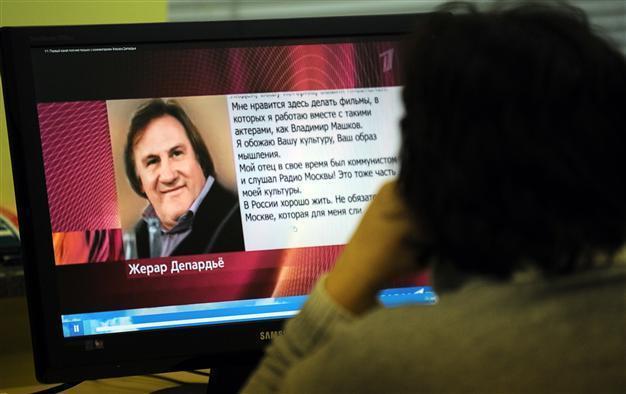Russians mock Kremlin decision on Depardieu passport
MOSCOW - Agence France-Presse

A woman looks at a computer screen displaying a webpage of Russian TV station Pervyi Kanal internet site in Moscow on January 4, 2013 that shows a picture of French actor Gerard Depardieu and a letter by the actor translated into Russian. AFP photo
Russians reacted Friday with amusement, disbelief and a heavy dose of irony to the news that the Kremlin has granted citizenship to French actor Gerard Depardieu to solve his tax woes.
In a letter broadcast on Russian television on Thursday, the former Oscar nominee declared his love for President Vladimir Putin and called Russia a "great democracy." "He is impressed by our democracy -- he has completely lost his marbles," wrote one Facebook user, Vladimir Sokolov.
Far-left politician Eduard Limonov suggested Depardieu could reprise his famous film role of French revolutionary Georges Danton and risk detention by riot police at a regular unsanctioned rally against Putin.
"Gerard, come to Triumfalnaya Square on January 31 with your new Russian passport in your pocket," Limonov wrote on his blog. "Our French friend: here's an invitation to a real historical role." Depardieu seemed unlikely to take up this offer after Putin praised their "very friendly, personal relationship" at a recent news conference.
Many jokingly speculated about how the film star might adapt to life as a pensioner if he moved to Russia after threatening to renounce his French citizenship over a proposed 75-percent tax rate on the super rich.
If Depardieu, 64, opted to live in Russia more than half the tax year, he would pay just 13 percent tax to the government whose budget is highly dependent on state-owned energy resources.
"We're going to meet him pushing a trolley in the shop, in the queue for blood tests at the polyclinic or at the social security office," wrote journalist and blogger Anton Orekh on the website of popular Moscow Echo radio station.
As a Russian, he now qualifies for a respectful patronymic and can be addressed not as Monsieur Depardieu, but Gerard Renevich, because his father's first name was Rene, Orekh added.
"I'm ready to let him register as a resident in my apartment, he can stay as long as he likes," wrote television host Tina Kandelaki on Twitter.
Depardieu, like other Russian citizens, would have to register his place of residence with local authorities.
Yet some also questioned the morality of Russia fast-tracking Depardieu's citizenship request.
His public opposition to paying high taxes in France showed he "loves money more than motherland," wrote Orekh.
"Let's give our passports to everyone who has lots of money and doesn't want to pay taxes at home!" he said, contrasting Depardieu's experience with that of ordinary applicants who spend years going through complex red tape.
Poet Lev Rubinshtein warned Depardieu on Facebook that if he chose to pay taxes in Russia, they would go to "gorillas with batons who joyfully beat up young men and women and old ladies." Russia has used Depardieu's request to preen itself over what it sees as an endorsement of its economic policies.
"Depardieu's case shows that financial and economic stability are often the most important factor in choosing a country not only for investors but for artists, too," former economic development minister and now head of Russia's largest savings bank, German Gref, told the Interfax news agency.
Meanwhile Depardieu's threat to give up his passport over soaring tax demands has prompted much soul-searching in France.
Right-wing daily Le Figaro described the affair as a "bad farce" but stressed in a front-page editorial that "this 75 percent tax is an economic, political and diplomatic fiasco that we should not be smiling about." The canny PR stunt comes as Russia faces widespread international criticism over a recent decision to ban adoptions of Russian children by US citizens, and looks like an attempt to deflect public attention.
"Giving Depardieu citizenship is a strong PR move inside the country but it is the anti-orphan law that influences Russia's image worldwide. This can't offset that," wrote Alexei Venediktov, chief editor of Moscow Echo, on his blog.
Putin last week signed a law banning US adoptions despite emotional appeals after Washington passed legislation targeting the Russian officials who were allegedly involved in the prison death of a lawyer, Sergei Magnitsky.
